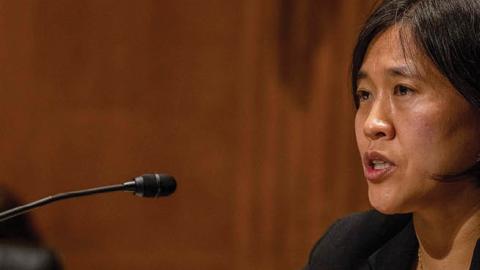The Senate recently confirmed Katherine Tai to be the 20th United States Trade Representative. In that role, Tai will be the chief negotiator for President Biden’s and Congress’s trade priorities. The Senate had quite a few questions about what Joe Biden’s trade priorities could be during Tai’s confirmation hearing held on Feb. 25. Most of the hearing focused on the big issues: China, the World Trade Organization (WTO), the U.S.-Mexico-Canada (USMCA) trade agreement, American workers and climate change.
But the U.S.-Japan Trade Agreement (sometimes referred to as the U.S.-Japan phase-one deal) was seldom mentioned, despite the fact that Japan is the U.S.’s fifth largest trading partner and number one foreign investor. Why?
The first reason could be that the deal is simply on no one’s radar right now. Senators don’t know everything, they don’t have the time and so it’s not uncommon for them to focus just on big-ticket items like the USMCA or China.
A second reason could be that this was simply a nomination hearing. Even if Tai were asked what her plans for the deal were, she might not give an answer. Instead, she would likely insist her team would review current U.S.-Japan trade negotiations. For example, during the hearing she has already committed to reviewing the advisory process for future trade agreements, the state of U.S.-U.K. free trade negotiations and the impact of the Airbus-Boeing dispute with the European Union.
This was the case in questions asked after Tai’s hearing. Asked if she would expand U.S.-Japan trade negotiations, her response was “I commit to undertaking a detailed assessment of the current state of the U.S.-Japan trade relationship in light of the recent U.S.-Japan Trade Agreement to determine the best path forward.”
The final reason could be that American and Japanese trade negotiators are fine with the current deal. This certainly seemed the case under the Trump administration. Former negotiators didn’t want to take the next step and negotiate a comprehensive free trade agreement then; that might still be the case now.
Just a few days after Tai’s hearing, the U.S. released its annual trade report. The report highlighted that tariff treatment under the U.S.-Japan deal matched those Japan provides to countries in the Comprehensive and Progressive Agreement for Trans-Pacific Partnership (CPTPP). With that kind of access, what more could the U.S. ask for?
Despite the increase in market access from Jan. 1, 2020, U.S.-Japan trade in goods (both imports and exports) fell by almost 16% last year because of the pandemic and global recession. U.S. and Japanese global exports are now recovering and will likely continue to grow as demand remains strong. But this will likely have little to no impact on trade negotiations.
If anything, the increasing worry about China in Washington will have a bigger impact on U.S.-Japan negotiations than anything else. Last year, there was a lot of concern that the U.S. could be falling behind, either economically or diplomatically, as Japan, China, and 13 other countries signed the Regional Comprehensive Economic Partnership.
Looking at how the U.S. can reengage with Asia through trade, there were some questions about the U.S. joining CPTPP at Tai’s hearing.
Several senators, mostly Republicans, asked Tai her thoughts on joining the agreement. Tai’s general feelings about joining the CPTPP were, “Much has changed in the world since the original TPP was signed in 2016. If confirmed, I will review the CPTPP to evaluate its consistency with the Build Back Better agenda.” While her answer can be interpreted a couple different ways, it doesn’t sound optimistic, and the criticism of trade in Congress still makes joining CPTPP an unlikely event.
As difficult as resuming bilateral U.S.-Japan trade negotiations can be, with more sensitive issues to be covered like rice and automobiles, not wanting to continue negotiations can also be a problem for both the United States and Japan.
The current trade deal is also quite limited. Though the U.S. and Japan both have some of the lowest tariff rates in the world, the deal only reduced tariffs on less than 1,000 industrial and agricultural goods between the U.S. and Japan when thousands of products are traded every year.
Per U.S. and Japan commitments to the WTO, however, specific trade agreements must cover “substantially all trade” between members or else be in violation. Not having a comprehensive deal could mean other WTO members could bring a complaint at the WTO, though this would be more of a gesture than have any meaningful impact on either the U.S. or Japan in the short-term. So it’s questionable whether negotiators will feel any pressure from WTO members to resume negotiations anytime soon.
It’s also important to recognize that the Biden administration has been pushing to work with allies on all sorts of trade and security issues. They seem to be off to a good start. With a number of bilateral phone calls and upcoming visits, it’s safe to assume the U.S.-Japan relationship will be a main focus for this administration.
Unlike during the Donald Trump administration, which took a confrontational approach with allies and competitors alike, the Biden administration and that of Japanese Prime Minister Yoshihide Suga will be looking for more areas to cooperate than negotiate. This means continuing the good efforts started during the Trump and Shinzo Abe administrations to work with the European Union on WTO reform.
But it also means they could push aside the politically difficult issues, like finishing a comprehensive U.S.-Japan free trade agreement. Not investing more in bilateral U.S.-Japan trade negotiations would be a mistake for both the Biden administration and Congress.
Just because trade negotiations can be politically difficult doesn’t mean they should be ignored. The U.S. and Japan are stronger trade and security partners now more than ever. Both should work together more on various economic issues, even if that includes those issues that could put some strain on the relationship. The two countries will come out even stronger in the end for it.
Read in The Japan Times

















